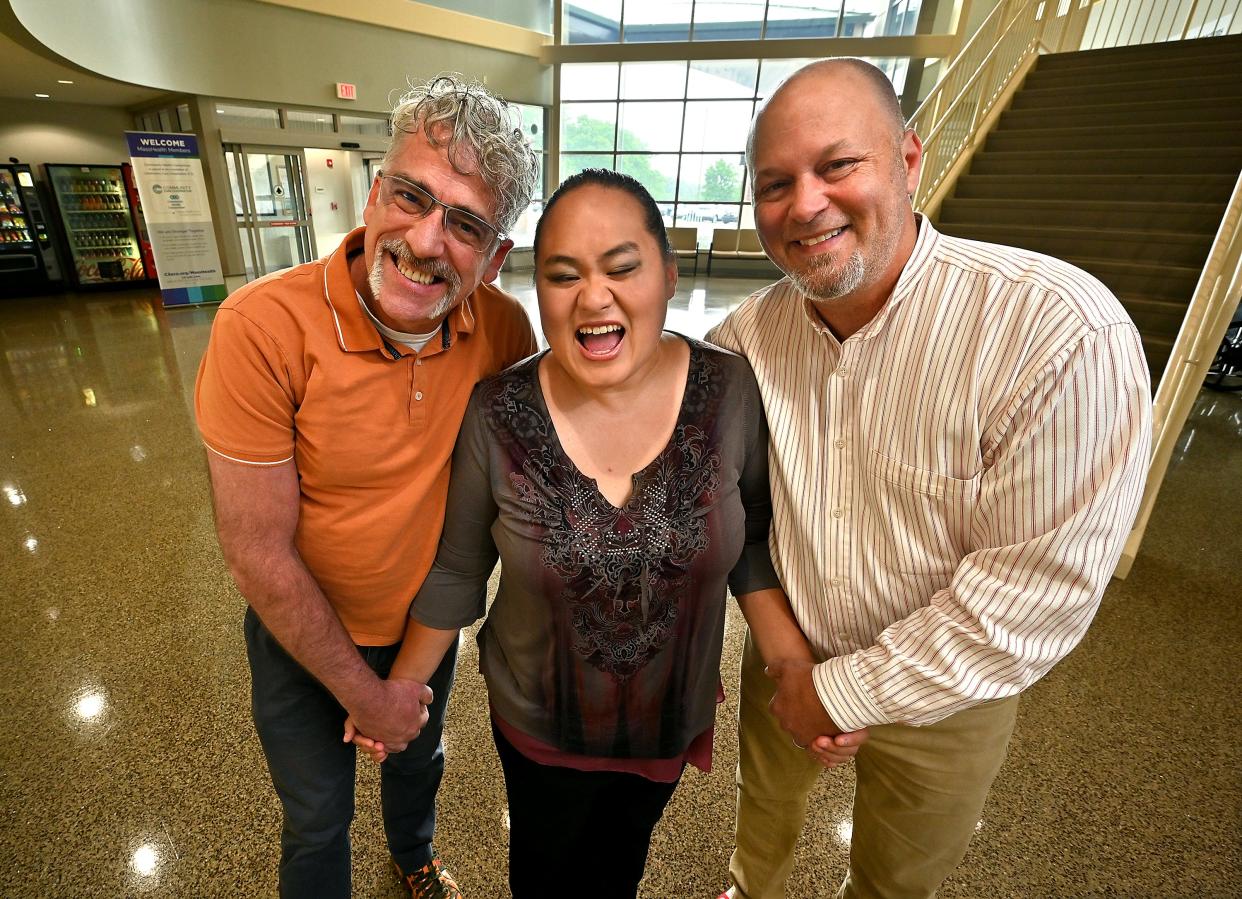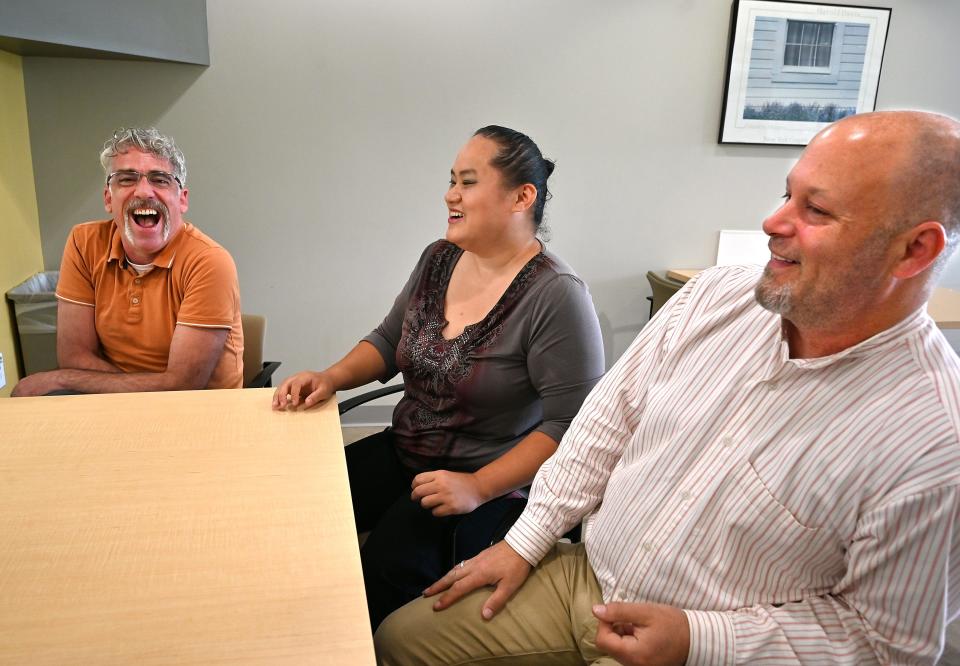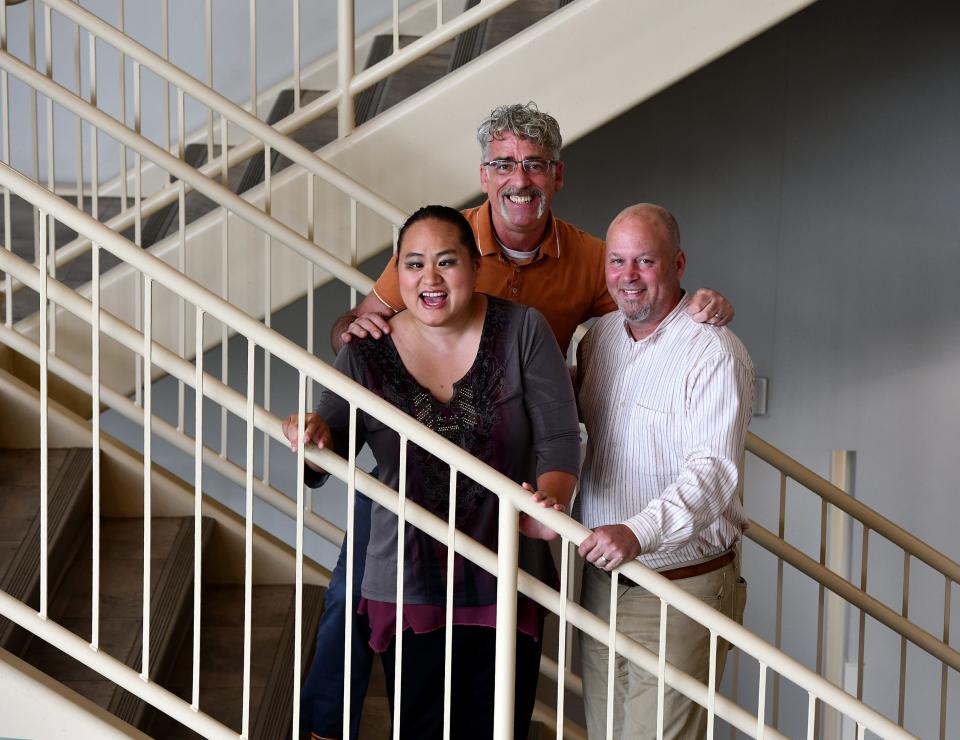In the spotlight: For Lavender Darcangelo, 'AGT' the next stop in a remarkable journey

To an outsider, the Darcangelo family might look somewhat unconventional.
There’s Fitchburg native Wil Darcangelo, a former professional vocalist-turned-church minister who tells most of the stories. There’s his husband, Jamie Darcangelo, a nurse with kind eyes and a drooping mustache who prefers to stay out of the spotlight. Then there’s the natural center of attention, who will appear at 8 p.m. July 11 on NBC’s “America’s Got Talent”: Their adoptive daughter, Lavender.
The 28-year-old Lavender is blind and autistic, and over the past several years, her singing voice has caught the ears of thousands of people, both at concerts in Fitchburg and online across the country. With a few viral internet moments under her belt and an album in the works, Lavender decided that this would be the year she auditioned for “America’s Got Talent” in hopes of bringing her vocals to an even wider audience.
More: Worcester's Cara Brindisi silenced on 'The Voice' after delivering Bonnie Raitt classic
More: Ricky Duran edged out in 'The Voice' finale
More: Porter found 'Voice' transformative
Lavender's audition took place earlier this year and will air July 11, when audiences can watch her showcase her powerful voice for judges Simon Cowell, Heidi Klum, Howie Mandel and Sofia Vergara and host Terry Crews.
On a June afternoon, following a morning of music rehearsal, Lavender and her two dads sat together at a table in the airy lobby of Community Health Connections in Fitchburg. Wil took the lead in telling tales from the TV set and the family’s journey, with Lavender chiming in to provide her point of view on each story.

'Yearning for a place to belong'
The Darcangelos went as a trio to the “America’s Got Talent” set for auditions, expecting an environment that would be unkind and overwhelming to Lavender. Instead, they found a family-focused crew that had spent decades working together and a friendly group of fellow contestants. All three were particularly impressed by host Terry Crews and his enthusiasm for each contestant’s performance and story.
“It's the way that he talks. He's kind of contagious. I love it,” Lavender said.
“I don't know how he keeps it up because he interviews hundreds of people, but when he interviewed us, it felt like we were the only interview he had done all season,” Wil said. “The whole audience wants you to do wonderful. They don't want anyone to flop. (Lavender) was wonderful, and it was one of the best performances we've ever heard from her.”
This is not the Darcangelo family’s first time in the spotlight. In June 2019, a video of Lavender singing “Part of Your World” from Disney’s “The Little Mermaid” went viral on Twitter, gaining tens of thousands of likes and retweets.
More: Video of Fitchburg singer Lavender goes viral
The performance was part of a concert at First Parish Church in Fitchburg, where Wil is a minister, celebrating LGBTQ Pride Month and the 50th anniversary of the Stonewall Inn protests. Lavender said she chose “Part of Your World” because she related strongly to the song’s theme: yearning for a place to belong.
“At the time, I felt like I wasn't listened to because I'm blind and autistic and sometimes one community doesn't understand another. Sometimes I understand autism more than blindness,” Lavender said. “Sometimes I feel like I have a foot in multiple worlds because I have this thing that other blind people don’t understand, and then I have this thing that other autistic people don't understand, so that's where 'Part of Your World' comes in. One foot here, one foot there.”
Rufus Gifford, former U.S. ambassador to Denmark, was in the audience that day. When Lavender stepped up to the microphone and began to sing, Gifford recognized the music as one of his favorite songs and began to record video on his phone. When he posted the video on Twitter, it garnered the attention of “Little Mermaid” fans, disability advocates and news outlets from "Good Morning America" to the BBC.
“At first, he thought, 'Oh God, I'm going to have to listen to the minister's daughter sing,' but within two bars, he was already recording it because it was one of his favorite songs. He tweeted it, and we had every media outlet you could think of for 10 days,” Wil said.

'How do you know that thing is going to happen?'
During the COVID-19 pandemic, Lavender took a hiatus from singing for audiences, instead working on her vocal skills and an upcoming album, which will feature a variety of music genres and will be titled “Mosaic.” This year, she decided she was ready to start pursuing a music career again and wanted to do so by auditioning for "America’s Got Talent."
“I think what made me go out of this hiatus is the evidence that I have that even though I am autistic, people are willing to accommodate that,” Lavender said. “If I were neurotypical, it would be different, the expectations would be different, but throughout those three years, I started to see that evidence for that belief. As long as I have people who know where my limits are, I can do it.”
Wil said the family had discussed the potential of a major music career for Lavender and decided that if she makes it big from her “America’s Got Talent” appearance, a part-time music schedule would work best to accommodate her needs, as opposed to the exhausting tours and hectic release timeline that many pop stars have.
“I would think that in the future, people who are neurotypical and don't want that type of career can look at Lavender and say, 'Well, she made it and she has her fans that she engages with online, and she releases music on her own timetable,’ ” Wil said.
“It's not just me, but the pandemic has really made people rethink their work-life balance. My boyfriend's mom is one of those people and loves working from home now. It makes me wonder what the music industry thinks,” Lavender said.
Lavender said when she finds herself rethinking something, whether work-life balance or anything else, she often turns to advice from Wil, who maintains as part of his spirituality that everything happens for a reason and everything works out in the end.
“I live with my boyfriend now, and I think that a lot of the things that I give off to him, a lot of the things I say, are because of Wil. 'Don't worry about it. It's going to work out,’ ” Lavender said. “For example, I don't believe in worrying about plan B until you need to. My boyfriend is a little more pragmatic, where I'm like, 'How do you know that thing is going to happen?' ”
'I have perfect pitch, can I be in the band?'
Wil said he had known for a while he wanted to become a Unitarian minister, focusing on empowering people no matter what their religious beliefs, but in practice, his ministry began when he returned to his old high school to bring music to another generation of Fitchburg kids.
As a teenager at Fitchburg High School, Wil endured intense bullying, and at the same time, he embraced the musical talent that would eventually lead him to become a professional singer. By the 2000s, he decided he wanted to create a safe haven where students going through similar bullying could express themselves without being targeted.
In 2010, he founded the Tribe Music Mentorship Program, an afterschool music program centered around a band called the Tribe, and began rehearsing classic tunes with them, driven by, as he said, “the idea of recording with kids that might be like I was at their age.”
“(In high school) I had some professional-level ability but no experience, so I thought I would do my album with them and give them experience and it'd be a lot more inspiring. The year I started that project, I met Lavender,” Wil said. “She came up to me in the cafeteria at the high school and said, 'I have perfect pitch, can I be in the band?' I said absolutely.”
A lot of the students who were part of the Tribe had trouble fitting in, and as often happens with groups where everyone has been bullied or outcast in some way, the reasons other kids teased them were the reasons they became friends.
Lavender experiences synesthesia, a phenomenon where the brain registers one sense and feels another sense as a result. For example, some people with synesthesia might hear certain sounds when they smell certain scents, and others might see certain colors when they read certain numbers. When Lavender hears a voice, she feels a physical texture beneath her hands. Each texture has its own name and each member of the Tribe had a nickname based on the texture of their voice.
“Lavender was made fun of a lot for having synesthesia and describing it, and a lot of these kids had no sense of belonging, so by Lavender having a place in the group and all these kids getting their own nickname, it made them feel that sense of belonging and made her feel like she has a right to be herself,” Wil said.
From beneath the table, Lavender produced a drinking cup with ridges on its sides and a rubber Koosh Ball, explaining to Worcester Magazine’s reporter and photographer that these were the textures she felt when she heard their respective voices. She said most men’s voices sound to her like the texture of the Koosh Ball, and her favorite texture to hear in a voice was the cup.
'We all have languages of blame'
Not long after joining the Tribe, Lavender asked for the first time if Wil would adopt her. He respectfully declined, but after he came to understand her situation and she asked him again a number of times, he decided there was definitely room for her in his family.
“Lavender was really struggling with her biological family, who we don't want to disparage because they're part of our community. Her autism was a challenge to her bio family and they weren't able to provide the understanding that she needed,” Wil said. “She couch-hopped for about six months with other Tribe families and then moved in with Jamie and I right when we came home from our honeymoon.”
The Darcangelos’ first move was to pursue adult foster care for Lavender, but the potential foster arrangements fell through. On Father’s Day 2017, Lavender asked one more time if the couple would adopt her and they finally said yes. One year later, at 22 years old, she became their legal daughter.
“I was a 22-year-old infant. I never had my terrible twos with them,” Lavender joked.
According to Wil, Lavender’s experience growing up around adults who did not understand her conditions had convinced her that she was unintelligent, when in reality, she had a quick mind — she just needed to communicate in specific ways.
“When Lavender and I first met, she constantly called herself stupid, all the time, and if I corrected her she would get mad at me,” Wil said. “She would get angry that I would contradict her negative self-talk and I would say, 'Here's some examples of how you're smart.' ”
Lavender said the kindness that first made her uncomfortable when she joined the Tribe as a high school student slowly became the reason she trusted him.
“I was mad because he was letting himself in, in areas where I wanted that wall up,” Lavender said. “We all have languages of blame, and I still have some blame in my narrative, and when I'm around Wil and Jamie, it makes me regret some of the narrative I still have.”
“That’s deep,” Wil said in response, leaning back in his chair with a laugh.
Whether or not Lavender’s music career takes off nationwide after “America’s Got Talent,” she has other, bigger plans in mind for the future.
“I want to found a school where there isn't any sort of classes, and if there are, they're directed by the students. The learning is based off of the intrinsic needs that the student has and their curiosities. I want it to be a school that starts off with playing and then the kid is like, 'What's a frog? What's a fish?' ” Lavender said. “I want to create a school where behavior is communication.”
This article originally appeared on Worcester Magazine: Lavender Darcangelo of Fitchburg set for 'America's Got Talent'

